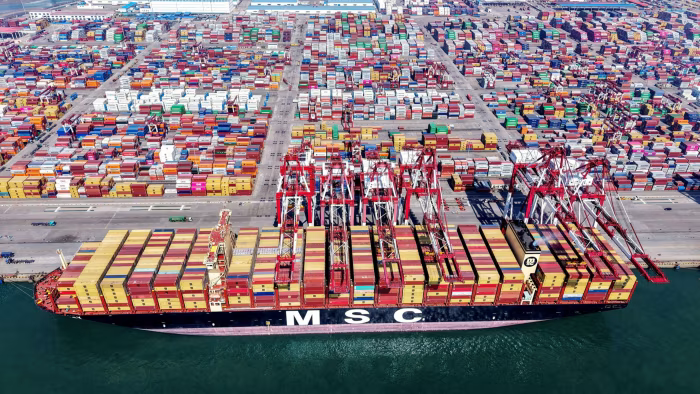China’s economy grew faster than expected in the first quarter of 2025, bolstered by strong exports and resilient domestic demand, though mounting tensions with the United States over tariffs are casting a shadow over the outlook for the rest of the year.
Official data released Wednesday showed China’s gross domestic product (GDP) grew 5.4% year-on-year between January and March, matching the previous quarter’s pace and exceeding the 5.1% forecast in a Reuters poll. The quarterly growth rate, however, slowed to 1.2%, down from 1.6% in the fourth quarter of 2024.
The better-than-expected performance was driven by solid retail sales and robust industrial production. March retail sales rose 5.9% from a year earlier, while factory output expanded 7.7%, both surpassing analyst expectations.
Economists noted that exports played a major role in propping up growth early in the year, as companies rushed to ship goods before steep US tariffs took effect. However, many warned that this frontloading may lead to a slowdown in coming quarters, particularly if current trade tensions persist.
“China had a very good start to the year, but we’ve seen similar patterns before — strong first quarters followed by weaker performance,” said Xu Tianchen, senior economist at the Economist Intelligence Unit.
He added that further policy support would be necessary to offset external pressures.
The upbeat data comes amid an intensifying trade conflict with the United States. President Donald Trump has sharply raised tariffs on Chinese imports, with some levies now reaching as high as 145%. China has responded with its own 125% tariffs on US goods, increasing uncertainty for exporters and global markets alike.
UBS analysts described the tariff standoff as an “unprecedented” challenge to China’s trade sector. The bank recently downgraded its 2025 GDP forecast for China to 3.4% from 4%, warning that prolonged tariff hikes could severely disrupt exports and domestic investment.
Similarly, ANZ slashed its 2025 forecast to 4.2% and signaled the need for substantial fiscal stimulus to support demand.
Despite government efforts to promote consumer spending and investment, challenges remain. Property investment fell nearly 10% in the first quarter, continuing a prolonged slump, and consumer prices declined 0.1%, raising concerns about deflation.
Unemployment, particularly among youth, remains elevated. Economists say this is limiting household spending and stalling broader recovery efforts.
Premier Li Qiang acknowledged the “profound” external changes facing exporters and pledged to increase support for domestic consumption. The government has signaled that more stimulus could be on the way, following last year’s monetary easing and a record budget deficit target set for 2025.
China’s National Bureau of Statistics emphasized that the economy remains resilient.
“We have the confidence and ability to cope with external challenges and achieve our development goals,” said spokesperson Sheng Laiyun.
Meanwhile, President Xi Jinping is visiting Southeast Asian nations, including Malaysia and Cambodia, as part of a diplomatic push to strengthen regional economic ties. His visit follows high-level US engagement in the region, highlighting the broader geopolitical backdrop to the trade dispute.
Although the International Monetary Fund and Asian Development Bank maintain forecasts of around 4.6% growth for China in 2025, analysts say much will depend on how the trade situation evolves in the months ahead.
“While today’s numbers are encouraging, they mask underlying fragilities,” said Raymond Yeung, chief China economist at ANZ. “Without a resolution to the tariff dispute, we expect growth to slow considerably through the rest of the year.”
With input from Reuters, the Financial Times, the Associated Press, and BBC.










The latest news in your social feeds
Subscribe to our social media platforms to stay tuned